Lady Seeks Advice After Animal Control Took Her Neighbor’s Blind and Deaf Dog for Biting Her
The Dangerous Dogs Act applies to you regardless of whether you own a large or small dog and regardless of how calm and friendly your dog is. It is illegal for a dog to be "out of control" or to bite or attack someone under the Act.
Sometimes, dog bites can occur as a result of a mistake or the dog's acting out of reflex or self-defense. But irrespective of the scenario, once it’s reported to animal control, they can escalate the issue no matter how minor it is.
This is the exact scenario for a Redditor, TraditionSilver9553, whose neighbor’s dog, who is deaf and partially blind, bit her out of sheer mistake. The dog is actually a lovely and peaceful animal, and she clearly understands that the bite incident occurred because the partially blind dog was acting out of reflex.
You see, the dog bit the OP because she grabbed her very roughly to keep her from running into the road, as she couldn't see where she was headed. But then, Animal Control got involved.
Scroll down to read how the entire story unfolded, leading to the Redditor having custody of the dog after it returned from quarantine. It was truly a strange circumstance that resulted in a remarkable ending.
More info: Reddit
Can I really stop them?

Bella is completely deaf and partially blind

She wasn't looking in my direction

Compassion and Understanding in Animal Welfare
The incident involving the blind and deaf dog emphasizes the need for compassion and understanding in animal welfare situations. Psychological research highlights that empathy plays a critical role in how individuals relate to others, including animals. When we extend compassion towards animals, it not only benefits their well-being but also enhances our own emotional health.
Studies indicate that fostering empathy can lead to stronger community bonds and a more profound sense of responsibility towards animal welfare. Understanding the unique needs of animals, especially those with disabilities, is crucial in promoting humane treatment.
Navigating Conflict with Empathy
Conflicts between neighbors can often escalate due to misunderstandings and a lack of communication.
Dr. Marshall Rosenberg, the founder of Nonviolent Communication, emphasizes the importance of empathy in resolving disputes.
By understanding each other's feelings and needs, individuals can find common ground and work towards solutions that benefit all parties involved.
It was a serious bite

Bella was just sitting by

They tried to pick her up

When conflicts arise, such as the biting incident, it’s essential to approach the situation with a mindset of problem-solving rather than blame. Research in conflict resolution emphasizes the importance of communication and collaboration in addressing issues effectively. By working together to find solutions, individuals can foster a more compassionate community.
Engaging in discussions that focus on understanding the animal's behavior rather than condemning it can lead to more positive outcomes for everyone involved.
The emotional attachment people have to their pets can amplify conflicts, as they perceive threats to their loved ones.
Research indicates that pet owners often view their animals as family members, which can lead to heightened emotional responses in stressful situations.
Dr. Karen Allen from the University of Buffalo explains that these strong emotional bonds can cloud judgment and escalate conflicts unnecessarily.
Here's an update from the OP

I know and love this dog

I did what I had to do

Education and Awareness in Animal Welfare
Education plays a vital role in shaping our perceptions of animals and their needs. Many people may not fully understand the challenges faced by animals with disabilities, leading to misinterpretations of their behavior. Research has shown that increasing awareness about animal welfare can significantly improve public attitudes and behaviors towards pets.
Implementing educational programs that emphasize empathy and responsible pet ownership can foster a sense of community and promote better treatment of animals.
The Importance of Open Communication
Effective communication is critical in resolving disputes, particularly in situations involving pets.
Dr. John Gottman, a leading relationship researcher, suggests that open dialogue can prevent misunderstandings and foster healthier interactions.
By addressing issues early and honestly, individuals can avoid the resentment that often builds over time.
The Reddit thread received 2K updates with over 200 comments in just a day after being posted. Redditors who commented on this matter were divided in their opinions.
While some believed that it was just a single bite that didn’t require quarantine, others stated that animal control was actually right to put the dog into quarantine to determine if clear signs of rabies could develop. We've gathered some of their comments below.
1. There may be an additional fee
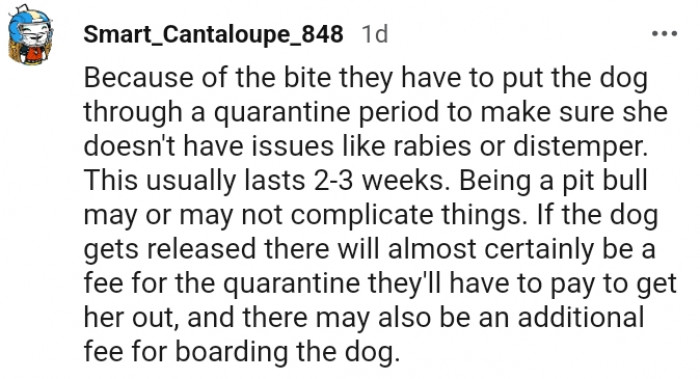
2. I didn't wish to press charges
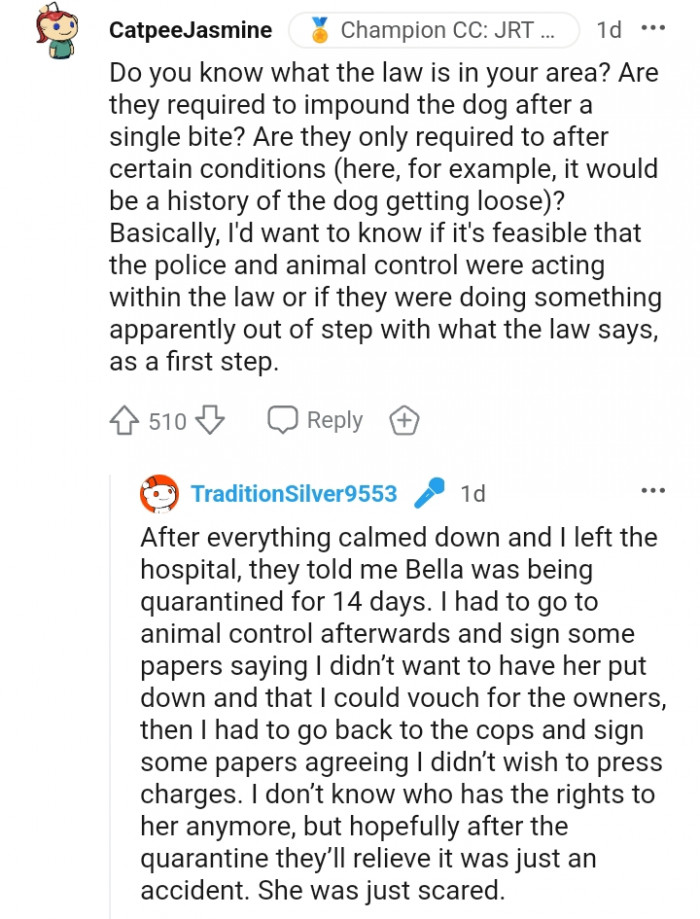
3. She will bite hard if she's scared
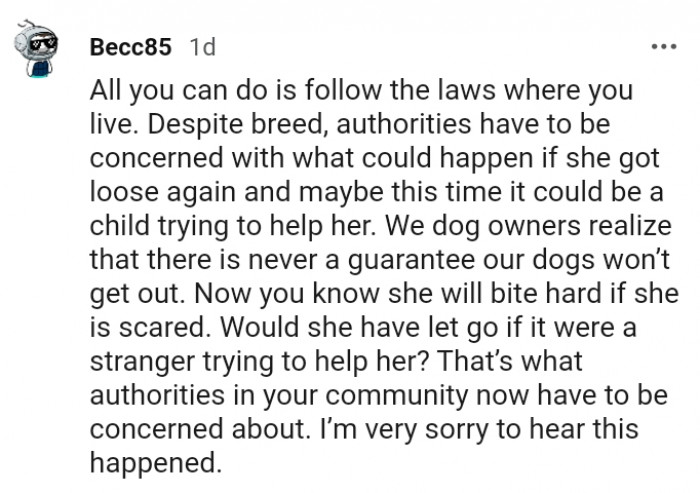
Additionally, advocating for compassionate legislation that protects vulnerable animals can create a more supportive environment for all pets. Encouraging community involvement in animal welfare initiatives can help individuals feel empowered to make a difference.
Ultimately, fostering a culture of empathy and understanding towards animals can lead to improved welfare outcomes and stronger human-animal bonds.
Experts recommend establishing a dialogue with neighbors to discuss concerns about pets directly.
Creating a schedule for pet care responsibilities or agreeing on boundaries for pet behavior can alleviate tensions and promote goodwill.
Regular check-ins can also help maintain open lines of communication and ensure everyone feels heard.
4. There was a freak accident with our dog
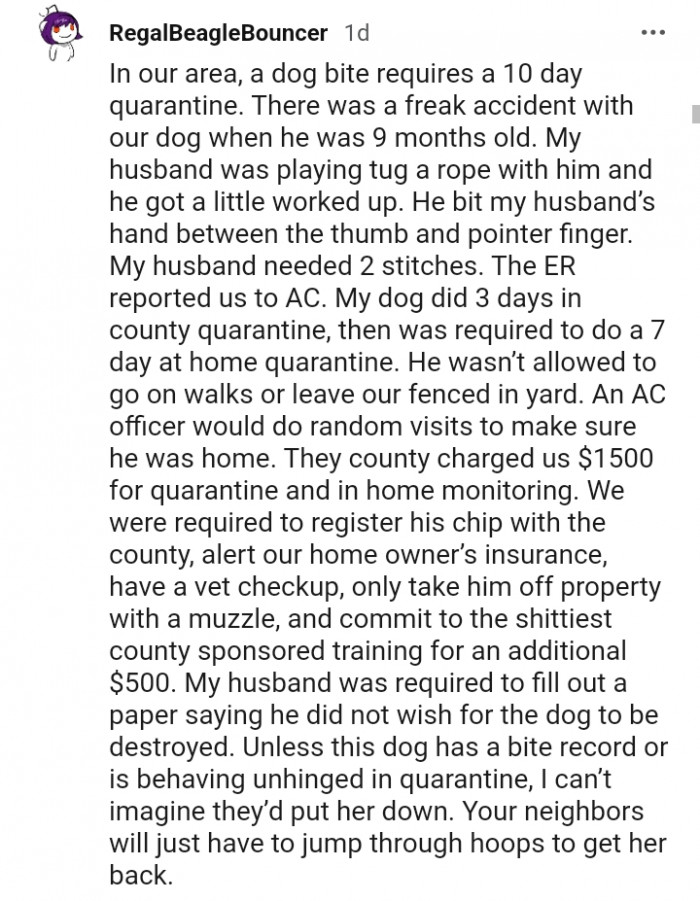
5. This dog has a prior history of biting
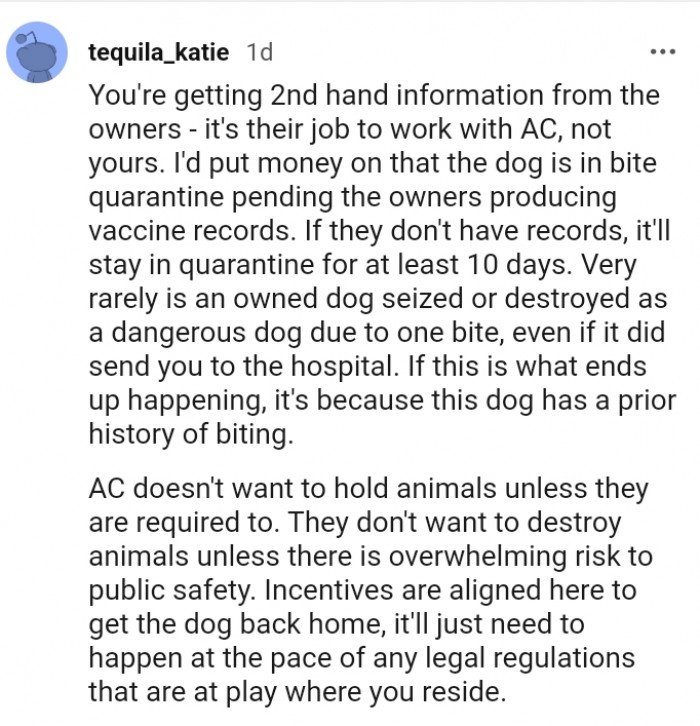
6. There is a mandatory quarantine time
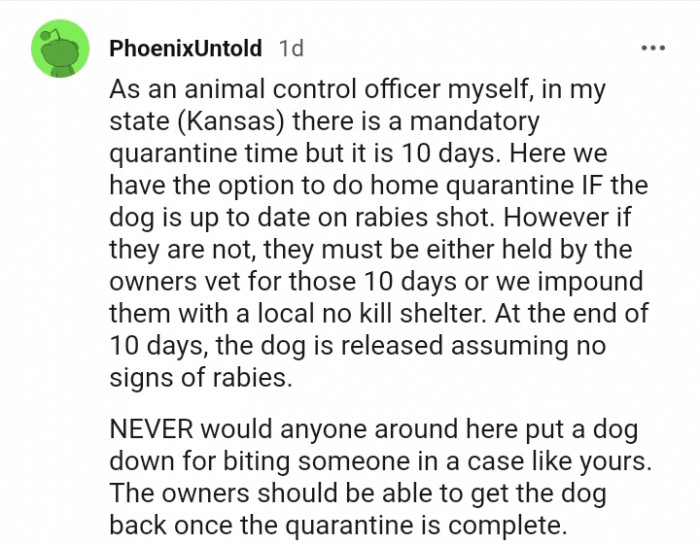
Building Community Through Compassion
Communities thrive on compassion and understanding, especially in shared living environments.
Dr. Brené Brown highlights that cultivating a sense of belonging through empathy can strengthen community ties.
When individuals practice compassion, they contribute to a positive atmosphere that can help mitigate conflicts before they arise.
7. None of these are your fault
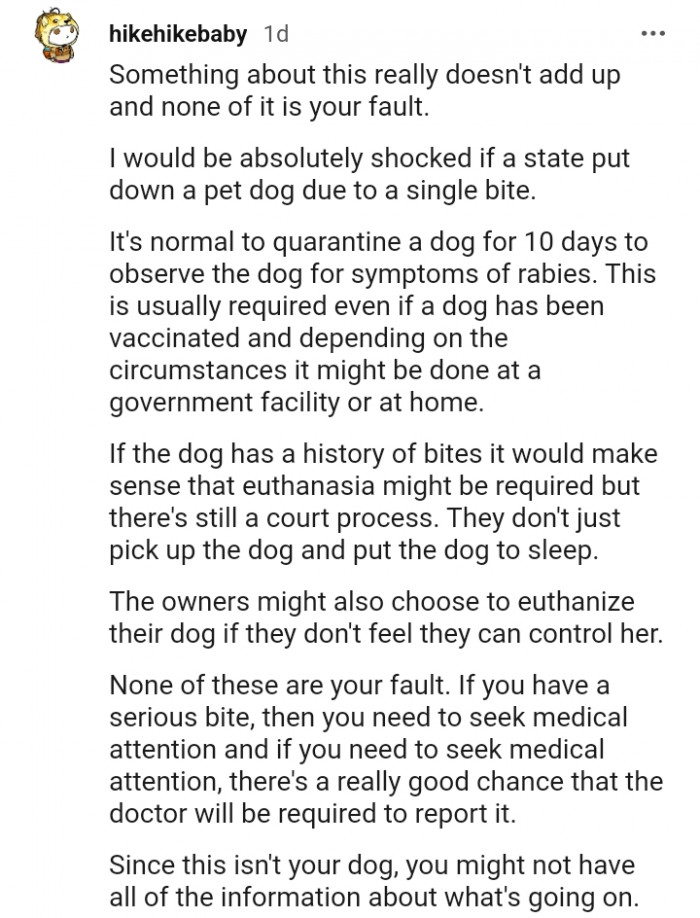
8. This Redditor is stating the best solution

9. I'm glad the dog is okay

Encouraging neighborhood events focused on pets can help foster connections among residents.
Such initiatives can provide opportunities for pet owners to come together, share experiences, and collaborate on solutions to common challenges.
Building a supportive community can significantly reduce the likelihood of conflicts.
10. I got bitten on the job
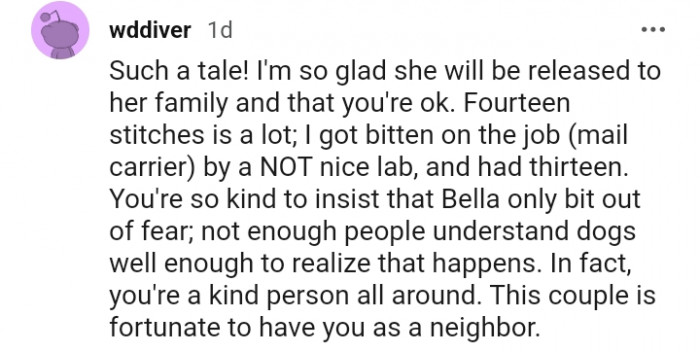
11. Disabled dogs are more easily frightened

12. Closing the day on a high note

13. The OP did everything right and received kudos from this commenter
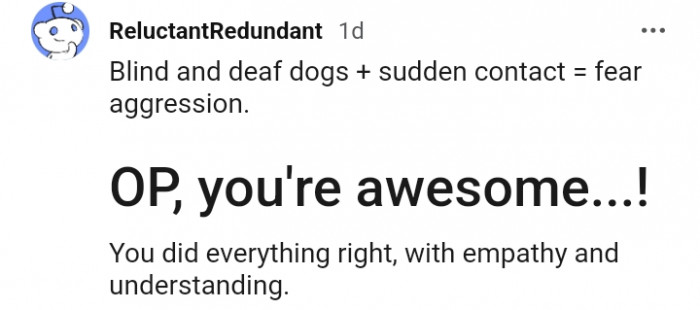
14. Taking extra steps to make sure she's not loose again
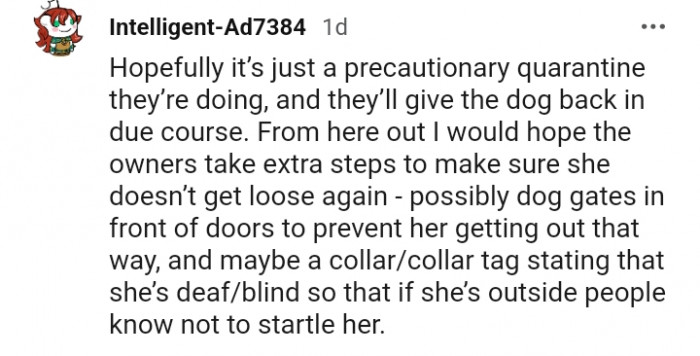
15. The OP has received some love from this Redditor

16. I hope everything goes well for you

17. You were just trying to help
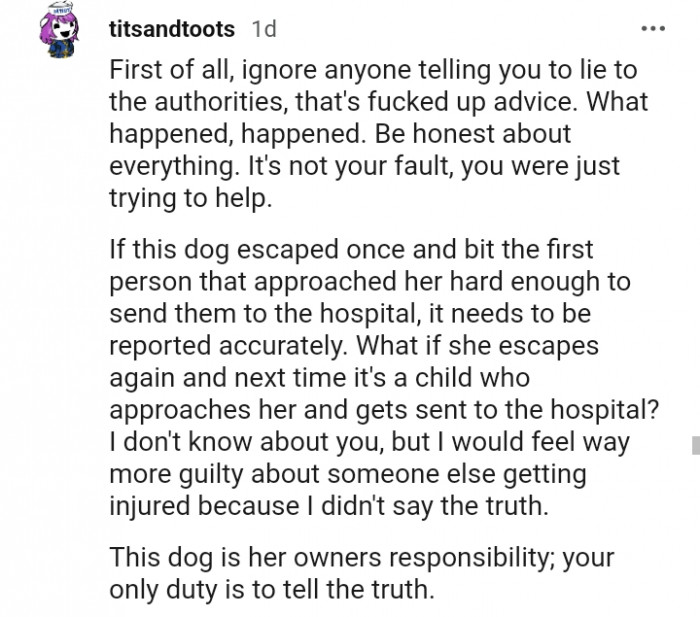
18. It could save her life while the system has her
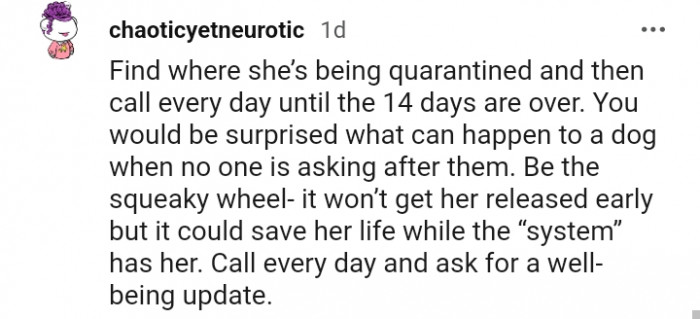
19. I'd probably bite them too

20. They should know exactly what's going on
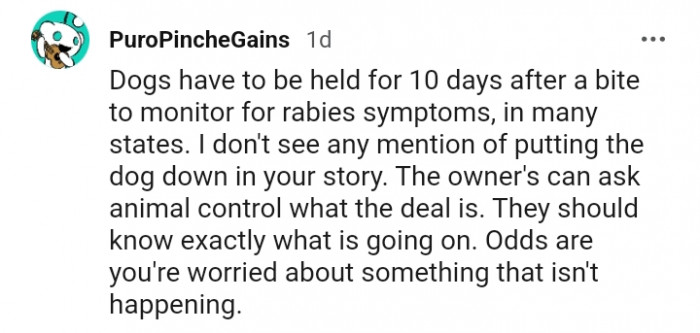
The update didn't end there, as the OP provided another update later on.
Here is the second update...


We hope that everyone will give dogs another chance, especially as they get older or in situations like Bella's. Many dogs are abandoned in shelters in their golden years due to issues like this, but it only takes a little extra time and patience.
Bella has always been a loyal companion, and in this situation, a little compassion is the least she deserves. Let us know what you think in the comments section below.
Psychological Analysis
This situation exemplifies how emotional attachments to pets can complicate neighborly interactions. It's essential for all parties to approach conflicts with empathy and a desire for mutual understanding.
By fostering open communication, they can navigate these challenges more effectively.
Analysis generated by AI
Analysis & Alternative Approaches
In conclusion, addressing conflicts related to pets requires empathy, open communication, and a willingness to collaborate.
Research shows that when neighbors approach issues with understanding and compassion, they can resolve disputes amicably and strengthen community bonds.
Creating a culture of empathy can lead to more harmonious living arrangements for all.
Analysis & Alternative Approaches
In conclusion, the psychological insights into compassion and understanding in animal welfare reveal the importance of empathy in shaping our relationships with animals. By prioritizing education and collaboration, we can cultivate a more humane society that respects and protects all creatures. Research supports the notion that empathy not only benefits animals but also enriches our own emotional lives.



